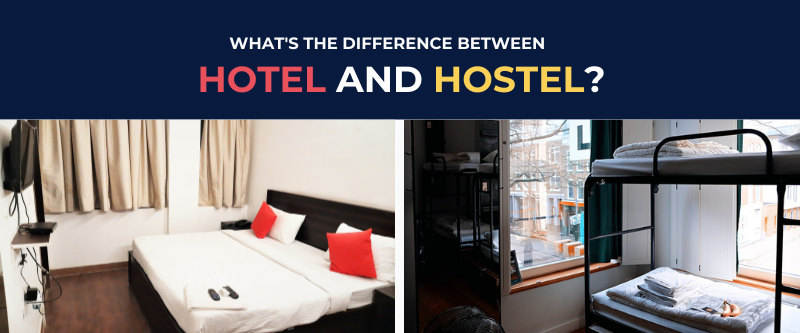Hostels and hotels operate on one common goal – providing guests the best place to stay. Yet, both are different like a memoir and an autobiography.
How?
Let’s find out…
Table of Content
What is the difference between a hotel and hostel?
Hostels differ from hotels in several aspects like operations, room type, and USPs. I have listed 7 such major factors here which will help you understand the difference between hotel and hostel.
1. Experience
One of the prime aspects that demarcates hostels from hotels is ‘Experience’.
In fact, the kind of aesthetic experience hostels provide is the reason for their exponential growth. You know the excitement of meeting strangers, learning about their culture and life stories, engaging in adrenaline pumping activities, sharing rooms with new friends; such experiences attract solo travelers at the hostel.
On the other hand, hotels have always been known for providing guests with comfortable and hassle-free stay. Moreover, guests opting for them look for the best services and luxury facilities (swimming pool, room service, recreational activities).
2. USPs
It’s true that USPs (unique selling points) do help in capturing the guests’ attention. Basically, they help you carve out a niche amongst your target audience.
Some of the commonly found USPs in the hotels are:
- Food quality
- Comfortable rooms
- Recreational activities (bar, spa, gaming lounge and others)
- Room service
- Multi-cuisine restaurant
Meanwhile, hostels have an entirely different set of USPs which are:
- Ravishing locations
- Community gathering activities (bonfire, adventure sports, barbeque nights)
- Quirky ambience
- Pocket-friendly rates
- Exquisite experience
- Location
Checkout this post from one of my favorite hostels – Zostel. See, how beautifully have have promoted their location with this Instagram post.
3. Target audience
The hospitality industry caters to various guest segments such as corporates, solo travelers, GITs (Group Inclusive Tours). Since hotels are omnifarious, all kinds of travelers can book them.
Hostels on other hand are opted for a lively experience and meeting new people. That’s why they are majorly preferred by millennials and GenZ. In fact,many international travelers book their stay in hostels rather than hotels.
The target audience of hostels are:
- Solo travelers (Nomads, explorers, wanderers, hippies)
- Backpacking enthusiasts
- Students
- Group of young people attending any events or fests
- Foreigners
4. Room type
Another major difference between hotel and hostel is the type of rooms they offer.
In hostels, dormitories are the primary room category. These dorms have four to ten bunk beds in one room, which serves the core purpose of hostel living.
However, the concept of shared stay affects the privacy of guests, making them opt for hotels.
Talking about hotels, they have varied room categories, ranging from budget to luxury. Depending on their budget, purpose, and required facilities they can book suitable room types.
5. Tariff structure
The tariffs offered to guests are on a per bed basis, unlike hotels where the rates are charged for the entire room even if it is a solo traveler.
Hotel room tariffs are calculated on the basis of room types, star categories, and services. For example, a budget hotel would offer a tariff of ₹1500 for its base room category, while a luxury one would have a rack rate of ₹8000.
6. Operational structure
The tariff difference between hotel and hostel, is a reflection of the services guests avail at both properties. As compared to hostels, hotels need to invest more in streamlining and managing their operations.
Why?
Because, guests book hotels for their services. Be it in-room dining, housekeeping, or maintenance; one phone call is all it takes to avail any services.
Due to low staff count, hostels provide limited services. But this does not stop them from giving an option of self service.
Guests have to do their own tasks, such as carrying luggage to their respective dorms, cooking meals, and cleaning the kitchen after the same.
7. Marketing strategies
It’s no secret that your content drives SEO. A cocktail of right keywords and engaging content delivered to the correct audience is necessary.
As hotels and hostels have different guest segments, their marketing strategies also differ. The former’s focus is on promoting the facilities, while the latter one markets aesthetic experiences.
The difference between hotel and hostel can be seen even in their offline marketing. Travel agents are the best source of offline bookings for hotels.
Talking about hostels, they partner with local vendors to facilitate bookings. Those are activity providers, local transport facilitators (cab or bus), restaurants, and many more. Apart from that, event planners do help hostels in fetching more guests.

Which one to choose?
‘Hostel vs hotel’ is one of the most searched topics in the last few decades. While the guests look for certain experiences, the investors analyse the profits each of them make.
I have stated 7 aspects that showcase the difference between hotel and hostel. Once you go through all of them, see which one to opt for your business model. In case you choose to start a backpackers hostel, I would recommend you reading this blog.


